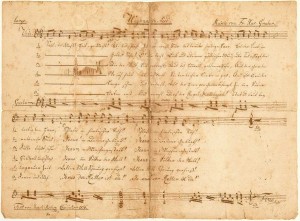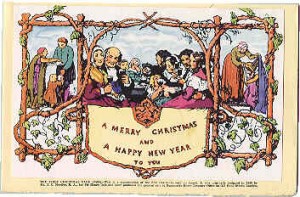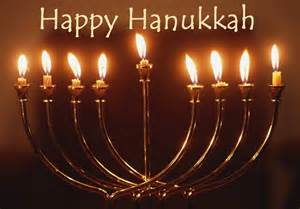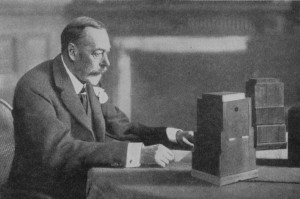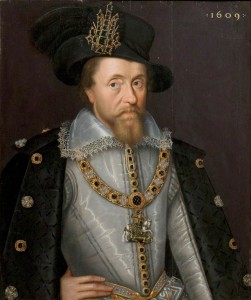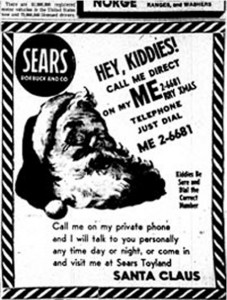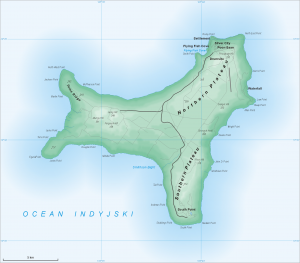Think You’ve got a Handle on Christmas? – A Yuletide Quiz to Test Your Knowledge
 How well do yo think that you know Christmas? Below are some Christmas factoids listed with possible answers. See how many you can get right.
How well do yo think that you know Christmas? Below are some Christmas factoids listed with possible answers. See how many you can get right.
| Ratings | ||
| 7 correct | ……………… | Top of the tree |
| 4-6 correct | ……………… | Clause for celebration |
| 0-3 correct | ……………… | Ho ho ho-pless |
(1) Which popular Christmas song was originally written in German by a Catholic priest and a school teacher? A:Silent Night. B:Hark the Herald Angels Sing. C:Jingle Bells. D:I Wish it Could be Christmas Everyday.A: Silent Night
Unfortunately, the St. Nicholas’ church organ wasn’t working and would not be repaired before Christmas. Because the church organ was out of commission, the actors presented their Christmas drama in a private home. The re-enactment of the nativity put assistant pastor Josef Mohr in a meditative mood. Instead of walking straight to his house that night, Mohr took a longer way home. The longer path took him up over a hill overlooking the village. From that hilltop, Mohr looked down on the peaceful snow-covered village. Reveling in majestic silence of the wintry night, Mohr gazed down at the glowing Christmas-card like scene. His thoughts about the Christmas play he had just seen made him remember a poem he had written a couple of years before. That poem was about the night when angels announced the birth of the long-awaited Messiah to shepherds on a hillside. Mohr decided those words might make a good carol for his congregation the following evening at their Christmas eve service. The one problem was that he didn’t have any music to which that poem could be sung. So, the next day Mohr went to see the church organist, Franz Xaver Gruber. Gruber only had a few hours to come up with a melody which could be sung with a guitar. However, by that evening, Gruber had managed to compose a musical setting for the poem. It no longer mattered to Mohr and Gruber that their church organ was inoperable. They now had a Christmas carol that could be sung without that organ. On Christmas Eve, the little Oberndorf congregation heard Gruber and Mohr sing their new composition to the accompaniment of Gruber’s guitar. Weeks later, well-known organ builder Karl Mauracher arrived in Oberndorf to fix the organ in St. Nicholas church. When Mauracher finished, he stepped back to let Gruber test the instrument. When Gruber sat down, his fingers began playing the simple melody he had written for Mohr’s Christmas poem. Deeply impressed, Mauracher took copies of the music and words of “Silent Night” back to his own Alpine village, Kapfing. There, two well-known families of singers — the Rainers and the Strassers — heard it. Captivated by “Silent Night,” both groups put the new song into their Christmas season repertoire. The Strasser sisters spread the carol across northern Europe. In 1834, they performed “Silent Night” for King Frederick William IV of Prussia, and he then ordered his cathedral choir to sing it every Christmas eve. |
(2) What happened in England for the last time in 1960? A:A white Christmas. B:The Post Office delivered letters on Christmas Day. C:Top-flight football matches took place on Christmas afternoon. D:A song unrelated to a TV talent show topped the charts.B: The Post Office delivered letters on Christmas Day
You can read more in our article on the history of the Christmas Card. |
(3) The Jewish festival of Hanukkah (which generally occurs around Christmas time) celebrates a victory over which ancient empire? A:The Romans. B:The Egyptians. C:The Seleucids. D:The Babylonians.C: The Seleucids
The festival is observed by the kindling of the lights of a unique candelabrum, the nine-branched menorah or hanukiah, one additional light on each night of the holiday, progressing to eight on the final night. Other Hanukkah festivities include playing dreidel and eating oil based foods such as doughnuts and latkes. |
(4) Which author wrote the text for the first royal Christmas Broadcast in 1932? A:Winston Churchill. B:Agatha Christie. C:Rudyard Kipling. D:George Orwell.C: Rudyard Kipling
The first speech was written by Rudyard Kipling and touched on the advance of technology that permitted the King to deliver an intimate message to all parts of the world, as well as mentioning the need for work towards peace and counselling listeners to aim for “prosperity without self-seeking.” |
(5) Which of these would NOT have been served for Christmas dinner in medieval Britain? A:Goose. B:Turkey. C:Peacock. D:Boar's Head.B: Turkey
It’s popular take up was also no doubt due to the fact in Victorian times when people had larger families, a goose wasn’t big enough. So they started using a turkey instead. Interesting Turkey Factoids : |
(6) Which of these organisations began tracking the journey of Santa Claus in the 1950s? A:The Church of England. B:The Post Office. C:The Finnish government. D:The North American Aerospace Defense Command (NORAD).D: NORAD
It all began in 1955 when a local U.S. newspaper misprint prompted children to call the Continental Air Defense Command (NORAD’s predecessor) instead of calling a special Santa hotline phone number. The officer on duty, a colonel, told kids he had spotted Santa on the radar screens. He said Santa was heading south from the North Pole and that was the point when a tradition was born in San Francisco and around the world. The tradition of NORAD tracking Santa has evolved over the years – expanding to a website and adding social media bells and whistles. But the Santa hotline still remains making it possible for the children to call NORAD to speak to a live operator to find out where Santa is on Christmas Eve. |
(7) How did Christmas Island in the Indian Ocean get its name? A:It was first spotted by ship during a heavy storm and is actually a corruption of 'crossed masts'. B:It was sighted by the person who named it on Christmas Day. C:It was once believed to be the southern hemisphere residence of Father Christmas. D:It is the only place on the world where gold, frankincense and myrrh can all be found in abundance. |

